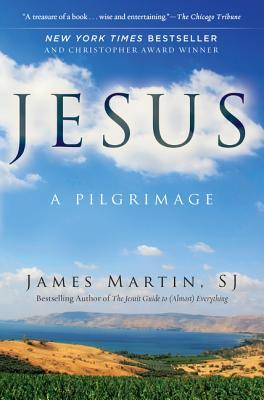This is one of those books mentioned during RCIA (nearly two years ago!) that I never felt quite ready to tackle: an entire book on Jesus, as told through the Holy Land lens. I was both excited and intimidated by the prospect, but I finally decided Lent was an appropriate time to explore it.
 This is part Bible study, part travel journal. I much appreciate the way each chapter is laid out, beginning with traveling to a destination and then discussing its relevance in Jesus’s life. Though the pilgrims did not travel in chronological order, as originally planned, the book tries its best to. We journey from Bethlehem to Galilee to Jerusalem; we delve into details surrounding both Jesus’s humanity and divinity. Every so often a personal anecdote is included, like an overenthusiastic cab driver or nearly dying of heat stroke in the literal Valley of the Shadow of Death.
This is part Bible study, part travel journal. I much appreciate the way each chapter is laid out, beginning with traveling to a destination and then discussing its relevance in Jesus’s life. Though the pilgrims did not travel in chronological order, as originally planned, the book tries its best to. We journey from Bethlehem to Galilee to Jerusalem; we delve into details surrounding both Jesus’s humanity and divinity. Every so often a personal anecdote is included, like an overenthusiastic cab driver or nearly dying of heat stroke in the literal Valley of the Shadow of Death.
I really enjoyed the chapters on Jesus’s humanity, which take up much of the early chapters. After all, during this time he was a simple carpenter, not yet ministering. Though we don’t know a lot about his early life, it’s easy to picture it with archeological evidence. Nazareth was a small, poor village, and the young Jesus likely knew everyone in his then-vocation. I’d never considered how much his preaching had been inspired by this experience, and how there are so many metaphors relating to construction and farming. That was his life.
The chapters on his actual ministry were regrettably not as interesting, but do offer some insight not commonly known. Fr. Martin has studied Greek, so he often discusses the original translation and intent. In traveling the land, he comes upon many locations (especially around Galilee) where Jesus would have been, and their descriptions are so vivid that you can nearly feel the salty air off the sea. I was often reminded of a phrase repeated during my own Israel excursion, when confronted with an area that Jesus may have been: “If not here, then near.”
Sometimes the book tries to do too much, and it’s clear than its original intent was a much larger tome. Between travel journal, Biblical study, and personal reflection, there’s a lot of information to take in. I do wish there’d been more talk of the pilgrimage itself, rather than retelling Gospel stories. It tries to cover this ground for non-Christians who may be reading, but I also feel it would be difficult to grasp for someone who doesn’t already know something of Jesus’s life.
One the whole, it’s a great read for Lent. The chapters on the Crucifixion and Resurrection hit it home, especially after exploring Jesus’s life and humanity. And it shows me how much I still need to see in Israel. Fr. Martin spent a lot of time in the Church of the Holy Sepulchre, whereas I regrettably did not. But I’ll return one day, and take some travel tips from his notes.
